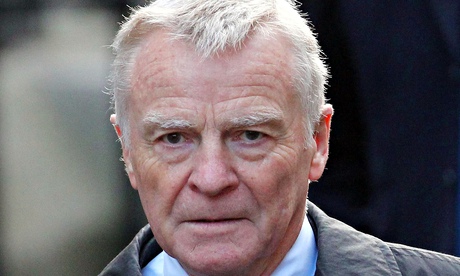
Max Mosley, the former head of Formula One, has launched a legal action against Google in the UK demanding that the search engine remove images of a him at a sex party.
The high court challenge, aimed at enforcing a court order made against the News of the World in 2008, will set a significant legal precedent in the control of online privacy.
Mosely, 74, has already won similar claims against Google in the German and French courts. The latest claim accuses Google of misusing private information and breaching the Data Protection Act. It relates only to pictures from the original publication.
Mosley said: "Adherence to the rule of law is essential to any society. This must include compliance with the decisions of the courts. As the gateway to the internet, Google makes enormous profits and has great influence, so I have not taken this action lightly. But Google should operate within the law rather than according to rules it makes itself. It cannot be allowed to ignore judgments in our courts."
Mosley sued the now defunct Sunday tabloid for grossly invading his privacy after it printed pictures and published video of him indulging in a five-hour sadomasochistic session with prostitutes in a Chelsea apartment.
He won the case against the newspaper and was awarded £60,000 in damages as well as costs. The News of the World had falsely accused him of taking part in a "sick Nazi orgy". Mosley, who is the youngest son of Sir Oswald Mosley, the former leader of the British Union of Fascists (BUF), said the role play at a rented Chelsea basement was harmless, consensual and private and had no Nazi overtones.
Mr Justice Eady, the judge in the 2008 case, said at the time: "The scale of the distress and indignity in this case is difficult to comprehend. It is probably unprecedented."
Mosely is being represented by Dominic Crossley, a dispute resolution expert at the law firm Payne Hicks Beach. Although it may appear similar, Mosley's claim is not based on the recent precedent of a European court of justice ruling that established a right to be forgotten in relation to a Spanish claimant who wanted to have a repossession notice deleted from Google searches about him.
Mosley, who gave evidence at the Leveson inquiry, has become a campaigner for privacy rights. His lawyers said the case concerned "the ability of individuals within the UK to enforce their rights against the large corporations that control access to the internet". The statement added: "It seeks to compel Google to stop gathering and publishing images that the English high court decided in 2008 were unlawful in the landmark privacy case Mosley v News Group Newspapers."
The case will reinforce the perception that Google has become a data processor and in effect a publisher of online material. Responding to the latest case, a Google spokesman said: "We have worked with Mr Mosley to address his concerns and taken down hundreds of URLs about which he has notified us."
Google is appealing against both the German and French court decisions. After losing the case in Germany in January, a spokesman said: "It could mean that internet providers are required to monitor even the smallest components of content they transmit or store for their users. We believe this is contrary to European law."
Google does not view itself as a publisher and is reluctant to be put in a position where it fears it will be made responsible for policing the internet. It has resisted building a pro-active filter system that would exclude the pictures of Mosley as it might also take down legal material.

